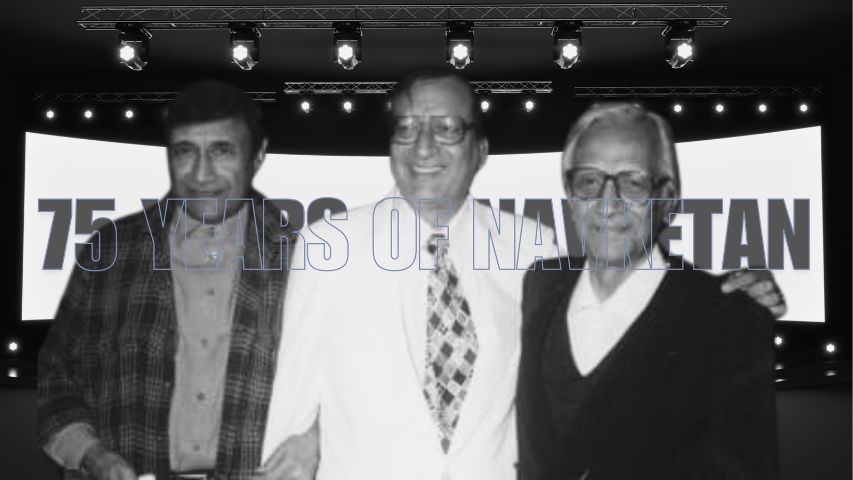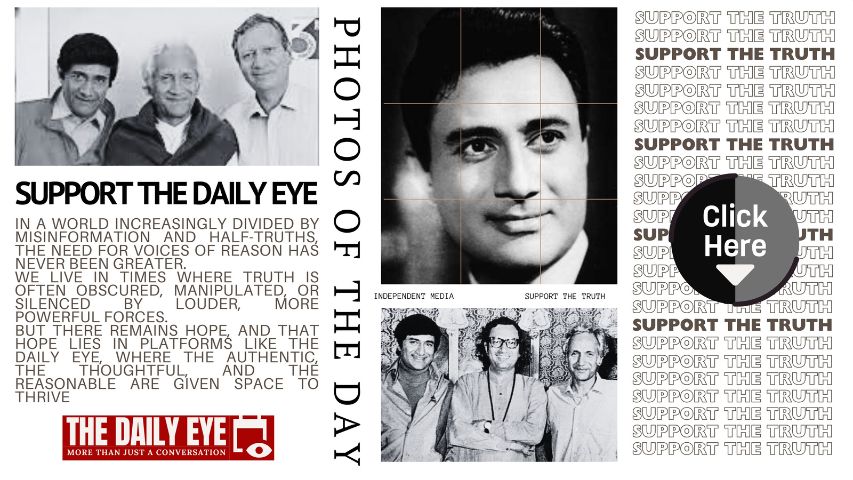
BOLLYWOOD: 75 YEARS OF NAVKETAN…A BRIEF HISTORY
by Sohaila Kapur December 18 2024, 12:00 am Estimated Reading Time: 4 mins, 15 secsCelebrating 75 Years of Navketan Films: A Legacy of Cinematic Brilliance, Sibling Bonds, and Creative Rivalries That Shaped Indian Cinema’s Golden Era from the 1950s to the 1970s. Sohaila Kapur writes…
Navketan Films, established in 1949 by Chetan and Dev Anand, revolutionized Indian cinema with path-breaking films like Baazi, Guide, and Jewel Thief. As the studio celebrates 75 glorious years, we revisit the creative journey of the Anand brothers—Chetan, Dev, and Vijay (Goldie) Anand. Their unique storytelling, iconic performances, and innovative filmmaking left an indelible mark on Bollywood's golden era. Find out how familial bonds, creative rivalry, and shared passion fuelled their cinematic genius, making Navketan synonymous with timeless classics and artistic excellence.
I was born into a family of creative and innovative people. Perhaps the ones who truly captured the nation’s imagination between the 1950s and 1970s—hyped as Bollywood's golden era—were my mamas (mother’s brothers), Chetan, Dev, and Vijay Anand.
Many books and articles have been written about Dev, the star; Dev and Goldie, the creative duo. However, only a few scattered mentions exist about the eldest, Chetan, arguably the most original of the three and the guru of the younger two.
What was their relationship like as siblings? Did professional rivalry ever turn personal?
It is fitting to recall their story on the 75th anniversary of their company, Navketan, celebrated this year.
My uncles were reserved, introspective, and occasionally argumentative—but always ready with the signature Anand grin to diffuse any tension. What I remember as a niece is their quiet support for each other—their Punjabiyat as brothers. When they met, it felt like reliving their days in Gurdaspur, Punjab, eating sarson da saag and makki di roti, bantering in Punjabi, and catching up on family news. Unlike typical Punjabi or filmi personalities, neither smoked nor drank.

It all began with Chetan, who abandoned his father’s dream of becoming a civil servant to pursue his passion for filmmaking. His debut film, Neecha Nagar, based on Maxim Gorky’s play Lower Depths, was perhaps India’s first art-house film. It was selected as India’s entry for the inaugural Cannes Film Festival in 1946, where it shared top honours alongside works by David Lean, Roberto Rossellini, and Billy Wilder.
Dev, after becoming a star with Ziddi (1948) opposite Kamini Kaushal, suggested starting a film company to create meaningful cinema. Chetan agreed, and Navketan was born in 1949.
Dev idolized his older brother, but creative differences emerged. For Chetan, the story was king, while Dev wanted the hero to be the central figure around whom the story revolved. They agreed to disagree. Dev then worked with young directors like Guru Dutt, Vijay (Goldie) Anand, and Raj Khosla, producing iconic films such as Baazi (1951), Nau Do Gyarah (1957), and Kala Pani (1960).
Chetan and Dev parted ways amicably in 1957. Chetan founded Mahashakti Films, later renamed Himalaya Films, during Haqeeqat's production in 1962. Meanwhile, Goldie, fresh from college, entered Navketan despite Dev’s initial scepticism about his youth and inexperience. Goldie’s storytelling prowess, editing skills, and song visualization genius soon made him a force in commercial cinema.
The Dev-Goldie collaboration defined the 1960s with hits like Kala Bazaar (1960), Hum Dono (1961), Tere Ghar Ke Saamne (1963), Guide (1965), and Jewel Thief (1967). Their films’ chart-topping songs and genre-defying stories—crime capers, comedies, and even a bold adaptation of The Guide—made cinematic history.
Guide, centred on adultery, was a daring project, released in both English and Hindi. It faced initial resistance but ultimately achieved cult status, earning national and international accolades.
However, after Tere Mere Sapne (1971), Goldie’s first socially conscious film, the magic faded. The film flopped, breaking their creative and financial spirits. They parted ways professionally. Navketan remained with Dev, while Goldie launched Navketan Enterprises.
Were there rivalries? Yes, but they were healthy. Perhaps Chetan and Goldie envied Dev’s star power, while Dev admired their filmmaking brilliance. Any tension was short-lived, overshadowed by their deep familial bond.
They reunited in 1976 to celebrate Navketan's silver jubilee. Chetan directed Jaaneman, starring Dev and Hema Malini, a remake of Taxi Driver (1954). He also helmed Saheb Bahadur, a remake of Navketan’s first film, Afsar (1950). That same year, Goldie made Bullet with Dev under Navketan Enterprises. However, times had changed, and the magic of earlier films couldn’t be recaptured.
When Chetan and Goldie passed away, Dev was inconsolable, having lost his brothers and creative partners—his mentor Chetan and his beloved kid brother Goldie, whom he had carried on his shoulders.
Ever resilient, Dev continued making films but with a bruised spirit. He passed away as he had wished—while contemplating his next film, sitting in a chair, waiting for his son to return from lunch. His death and quiet cremation in London ensured fans remembered him as their living idol.
The Anand brothers' legacy was celebrated through a theatrical narration by me, Anand Hi Anand, performed on December 12 at Triveni Theatre and December 13 at The Theatre, India Habitat Centre, New Delhi.





-173X130.jpg)

-173X130.jpg)

-173X130.jpg)
-173X130.jpg)
-173X130.jpg)
-173X130.jpg)